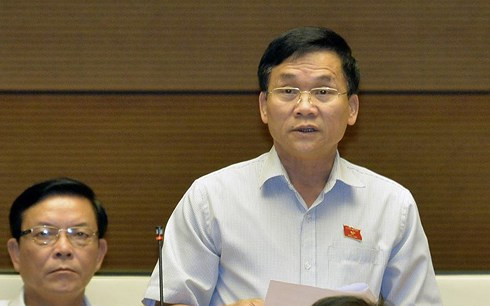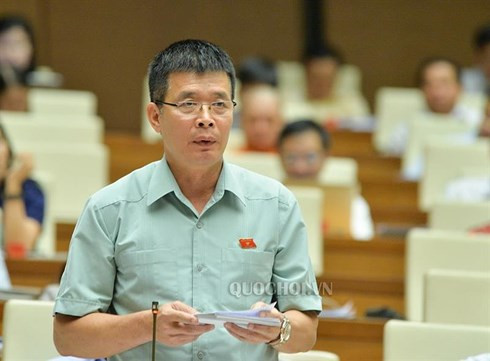If the commune police are regularized, how will the surplus force be arranged?
National Assembly delegates emphasized the need to develop a very specific and appropriate roadmap and especially assess the impact of the current arrangement of the commune police force.
This is one of the major issues in the draft Law on People's Public Security (amended) and received many opinions from National Assembly delegates discussed in the Hall on June 14.
Be careful and have a roadmap.
Delegate Tran Van Mao (Nghe An delegation) emphasized that, in terms of legal basis, the arrangement of regular police forces at commune level aims to concretize the provisions of the 2013 Constitution, both to ensure security and order maintenance activities at the grassroots level and to ensure human rights and civil rights are implemented in accordance with the law.
In addition, the security situation in rural and urban areas today is increasingly fraught with instability, with many social evils and criminal offenses arising, but the work of ensuring security and order at the commune level is still weak. The commune police force is not strong enough, weak in quality, lacking in quantity, requiring strengthening in all aspects so that the commune police can effectively perform their assigned tasks.
|
| Delegate Tran Van Mao (Nghe An delegation). |
However, delegates also noted that the project needs to carefully consider the roadmap for gradually regularizing the commune police force, to avoid disruption and impact on the commune police force currently operating.
Sharing the same view, delegate Hoang Thi Thu Trang (Nghe An delegation) said that the plan to mobilize about 25,000 regular police officers in the payroll to undertake regular duties at the commune-level police, although not increasing the payroll, but to ensure the stability of the government apparatus, it is necessary to build a very specific and appropriate roadmap, not to do it simultaneously and massively.
Along with that, it is necessary to issue specific policies on work arrangement and reassignment as well as satisfactorily resolve the regime and policies for the current team of commune-level police chiefs, deputy chiefs and police officers.
Delegate Nguyen Thi Phuc (Hung Yen delegation) was concerned that the Government and the Ministry of Public Security have invested a lot of funds, equipment, and facilities to open intermediate-level police training classes for the commune police force, mainly commune police chiefs and deputy chiefs. The policy of regularization will waste a force that has been professionally trained, causing negative psychology for police officers in both new jobs and remuneration policies.
Another issue that the female delegate raised was that if a local incident occurs, it will be difficult for the commune police chief and deputy chief from another place to be immediately elected to the Party Committee and People's Council. This will cause difficulties for the commune police chief and deputy chief to direct and coordinate the work of maintaining security, order and social safety.
"Therefore, the Drafting Committee and the Government need to consider more carefully and need to implement step by step with a roadmap, first implementing in places with complicated and necessary developments" - Ms. Nguyen Thi Phuc suggested.
The issue remains unanswered.
Delegate Phan Van Tuong (Thai Nguyen delegation) said that the direction of converting the commune police organization model from semi-professional combined with full-time to fully-professional has a basis, but is not yet solid, so caution is needed.
|
| Delegate Phan Van Tuong (Thai Nguyen delegation). |
According to Mr. Tuong, in the summary report and many opinions, the commune-level police organization without a semi-professional force cannot have a solid security posture and cannot have a widespread movement to protect national security.
Because they are local people, they understand the situation better than anyone else, understand customs, practices, and language, especially in remote areas, ethnic minority areas, and can easily integrate and connect with the grassroots, thus being able to grasp, detect, and resolve emerging problems and give effective advice in the right direction.
For the above reasons, the delegate proposed to develop an article on the communal-level semi-professional police, supplementing relevant articles to suit current practice in the direction of regulating organizational principles, regimes, and policies, while other issues are regulated by the Minister of Public Security.
"In the coming years, the model of commune and town police, which is a combination of full-time and part-time police, is still a budget-saving and effective model, so there needs to be a law on this issue," said Mr. Phan Van Tuong.
Delegate Nguyen Cong Hong (Dong Nai delegation) also raised unanswered questions in the impact assessment report. According to the report, there are 8,516 commune and town police chiefs and 13,580 deputy commune and town police chiefs, but the impact assessment report did not summarize how many police officers would be replaced by regular forces.
“A big question arises: How will this force solve employment and organizational stability?” - Mr. Hong raised the issue, and also noted that when transferring a specialized force from another place, how will the accommodation, food and living conditions for the cadres and their families be resolved so that they can work in peace and with peace of mind./.
"Unfortunate!"
Delegate Tran Thi Dung (Dien Bien delegation) expressed "regret" that there was a whole process of assessing the impact of the Commune Police Ordinance, but the issue of how to standardize the commune police force was only contained in a clause of an article in the draft Law on Public Security, the rest was assigned to the Government to specify in detail.
“The process of performing the tasks of the communal police force will greatly affect human rights, basic rights and obligations of citizens. Therefore, it is necessary to specify them by law. If we implement them by a Government Decree, it will become the decree of the People's Public Security Ordinance” – the female delegate said./.


